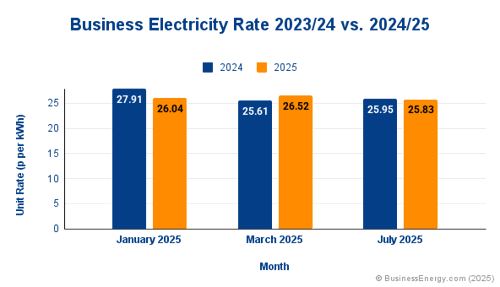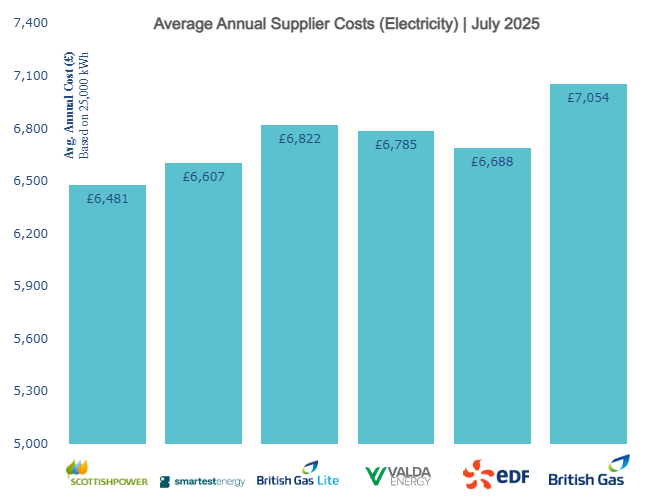Compare Business Electricity Rates
Take control of your business electricity prices in 2025
✔ Live business electricity prices in under 30 seconds
✔ Fixed tariffs available
✔ Full support for SMEs and large businesses
Compare business electricity quotes from trusted UK suppliers and fix your rate in minutes. Switch online today.

Business Electricity Quotes From Trusted Providers
Why Compare Business Electricity Prices With Us?
Comparing business electricity prices with us is fast, simple, and could save your business money.
We check live rates from leading and independent UK electricity suppliers, so you get the best available deal in seconds. Just enter a few details to compare, and switch online in minutes.
Useful Information When Switching:
Latest Business Electricity Prices
How to Get Our Best Business Electricity Deal
-
1
Enter your postcode and we'll find your meter
-
2
Compare live business electricity quotes from top UK suppliers
-
3
Choose the best deal, we'll handle the switch
Business Electricity Prices Per kWh
Compare business electricity costs using average unit rates and standing charges, broken down by business size. These figures offer a helpful benchmark before checking live quotes tailored to your energy usage.
Business electricity prices vary by usage and contract type. The table below shows average prices for each size band, based on a 2-year fixed contract.
Prices are accurate as of July 2025. Rates reflect the maximum annual usage in each category and are subject to market fluctuation.
Business size categories are based on annual electricity usage: Micro (up to 5,000 kWh), Small (5,000–15,000 kWh), Medium (15,000–25,000 kWh), Large (25,000–50,000 kWh), Very Large (50,000+ kWh).
| Micro (up to 5,000 kWh) |
27.1p |
40.5p |
£824.10 |
|
| Small (5,000-15,000kWh) |
26p |
49p |
£2,774.79 |
|
| Medium (15,000-25,000kWh) |
25.6p |
70.3p |
£6,668.80 |
|
| Large (25,000-50,000kWh) |
25.5p |
161p |
£10,149.52 |
|
| Very Large (50,000kWh) |
25p |
173.7p |
£19,356.14 |
Business Electricity Prices By Industry
Business electricity prices vary by industry due to differences in energy usage. Higher consumption often results in higher total annual costs, even if the unit rate remains similar.
Below are typical electricity prices by business type, based on estimated annual usage and current average rates:
| Business Type | Unit Price (p/per kWh) | Estimated Usage (kWh) | Annual Cost (£) |
|---|---|---|---|
|
Coffee shop/ Newsagent |
27.1p |
2,500 |
£824.10 |
|
Hair salon |
26p |
10,000 |
£2,774.79 |
|
Small farm |
25.5p |
37,500 |
£10,149.52 |
|
Restaurant |
25.6p |
20,000 |
£6,668.80 |
Rates are based on July 2025 averages and a 2-year fixed contract. For the most accurate rates, compare live business electricity prices using our comparison service.
What Affects Business Electricity Prices?
Business electricity costs are influenced by several external market factors that are outside your control, but understanding them can help you time your switch and secure a better deal.
Here's what to consider:
- Demand: Higher national demand increases wholesale electricity prices.
- Weather: Cold, dark, or extreme weather increases usage for heating and lighting.
- Commodity Prices: Electricity generation costs rise when fossil fuel prices (gas, coal, oil) increase.
- Carbon Costs: Generators using fossil fuels must buy carbon certificates, which increases prices.
- Delivery Constraints: Grid maintenance, outages, or supply issues can impact availability and cost.
Are Business Electricity Prices Still Rising?
Business electricity prices are no longer rising; average unit rates have been falling steadily since the peak of the energy crisis.
While electricity costs dominated headlines during the energy crisis, the market has since stabilised. Business electricity unit rates have dropped significantly, with prices expected to remain steady through 2024 and into 2025.
We reviewed the three most competitive fixed tariffs and found that the average cheapest electricity rate has decreased by around 0.12p per kWh between July 2024 and July 2025.

Business Electricity Supplier Prices
Compare average business electricity rates from trusted UK suppliers. Prices shown are from July 2025, based on 25,000 kWh annual usage over a 2-year fixed contract.
Business electricity quotes include two charges:
- Unit rate (pence per kWh) – the cost per unit of electricity used
- Standing charge – a daily fee to maintain your supply
To get the most accurate deal tailored to your business needs, simply enter your postcode into our 30-second comparison tool and view the latest live rates today.
| Electricity Supplier | kWh Unit Price | Standing Charge |
|---|---|---|
|
24.6p |
90.3p |
|
|
25.5p |
64.5p |
|
|
26.7p |
42p |
|
|
26.1p |
74.4p |
|
|
25.7p |
75p |
|
|
27.3p |
62p |
Here's what businesses could expect to pay per year for electricity with different suppliers, based on 25,000 kWh annual usage over a 2-year contract.
This gives a clearer idea of the total annual cost compared to just the unit rate and standing charge alone.
Prices are indicative only and based on live rates from July 2025. Actual quotes will vary by usage, region, and contract.

Business Electricity Quotes For All Business Types
Whether you run a small shop or manage a high-usage industrial site, our comparison tool delivers fast, accurate business electricity quotes tailored to your needs.
Business Electricity Quotes For Small Businesses
Small business owners often don’t have time during working hours to search for the best energy deal. Our online platform is designed to make switching simple, compare business electricity rates and complete your switch in minutes, 24/7.
Business Electricity Quotes For High Consumption Businesses
Businesses with high electricity usage typically require a half-hourly meter to track consumption accurately.
- If your peak electricity demand exceeds 100 kVA in any 30 minutes, a half-hourly meter is mandatory.
- Businesses with a demand over 70 kVA may also opt for a half-hourly meter to improve billing accuracy and access bespoke pricing.
Our service helps high-usage businesses access tailored quotes from major UK suppliers, including flexible contract options and specialist support.
Business Electricity Tariffs
When comparing business electricity tariffs, it’s important to understand the different types available to find the best deal for your company.
Our comparison tool lets you easily explore popular tariffs like fixed rate, renewable electricity, pass-through, variable rate, no standing charge, and deemed tariffs, helping you choose the right plan for your energy needs and budget.
Here are some of the most popular business electricity tariffs available:
- Fixed Rate Tariffs lock in your unit price for 1 to 5 years, protecting your business from wholesale price increases and making budgeting simple.
- Renewable Electricity Tariffs provide 100% green energy sourced from wind, solar, or hydro, often competitively priced or included as standard.
- Pass-Through Tariffs suit large energy users, combining fixed wholesale costs with flexible non-commodity charges, such as distribution fees.
- Variable Rate Tariffs offer monthly fluctuating prices based on wholesale rates, often with no cancellation fees, giving your business flexibility but less price certainty.
- No Standing Charge Tariffs remove daily fixed fees, so you only pay for the electricity used, though unit prices may be higher.
- Deemed Tariffs apply if your business starts using electricity without a contract or misses contract renewal, often resulting in higher rates. Always compare and switch to avoid costly deemed rates.
Should I Renew My Business Electricity Contract?
As your business electricity contract ends, you should receive a letter 60–90 days before confirming your contract’s exact end date and renewal options. Before agreeing to renew with your current supplier, we recommend comparing other offers to potentially save money that could be reinvested in your business.
If you don’t renew or switch to a better deal, you may be rolled onto a deemed tariff, which is usually more expensive. Renewing within your contract’s renewal window helps you avoid paying inflated rates.
Renewing through BusinessEnergy.com means our expert team manages all communications with your chosen supplier and negotiates the best available deal for you. We’ll also monitor your contract’s expiry and help you secure competitive rates on future renewals, so you can focus on running your business.
Business Electricity FAQs
-
How Long Does It Take To Switch Business Electricity Supplier?
We aim to switch our customers to their new business electricity supplier within 5 working days of approval.
-
What Is A Multi-Site Meter?
Got multiple business addresses? A multi-site meter allows owners to consolidate multiple buildings onto one contract and bill. This makes managing electricity usage for several sites much easier.
-
Can I Get A No Standing Charge Tariff?
Some suppliers offer no standing charge tariffs. Whilst on the surface, a no standing charge tariff may seem very appealing, suppliers will usually offset this by charging a higher unit price. Businesses using a small amount of electricity could benefit from this type of tariff.
-
Is Electricity Cheaper At Night?
Electricity is cheaper at night if an Economy 7 or 10 tariffs is selected. These are often called multi-rate meters. There could be multiple unit rates set by the provider for day, night and weekends.
-
What Is A Micro Business?
There are multiple benefits to being classed as a micro business including a requirement to receive a renewal notice. Businesses are classed as ‘micro’ if they fit into one of these categories:
- Employs less than 10-people and has an annual turnover of no more than €2 million
- Uses less than 100,000 kWh of electricity annually
-
Will My Electricity Supply Be Cut Off When Switching?
No, you won’t lose your business electricity supply during the switch. We will liaise with your new and old supplier to ensure your switch can take place seamlessly.
-
What Is The Climate Change Levy (CCL)?
CCL is an environmental tax used to encourage businesses to become more energy efficient. Any UK business can join the Climate Change Agreement Scheme to pay reduced rates.
The 2023 CCL rate for electricity is set at 0.00775 per kWh.
-
What Is P272 Legislation?
Introduced almost 10 years ago, the P272 legislation aimed to move all high-consumption users onto a half hourly meter.
This was phased in over time by energy regulator Ofgem for businesses in profile classes 5 to 8 to manage the Balancing and Settlement Code.
-
Does The P272 Legislation Apply To My Business?
All businesses in profile classes 5 to 8 that have an advanced meter installed are impacted. If your profile class is in this range, you need to upgrade to a half hourly meter asap.
-
What Is P322?
This is a further modification to profile classes 5 to 8 helping these businesses and suppliers move to a half hourly meter.
-
What Are Power Purchase Agreements (PPAs)?
Power Purchase Agreements (PPAs) act as contracts between a company buying energy and a renewable energy provider.
They set out the details for selling electricity over a specific time at a fixed price.These agreements are essential in supporting renewable projects, offering assurance of income for developers and ensuring stable costs for buyers in the long run. Renewable sources such as wind, solar, or hydroelectric power can be part of these agreements.






